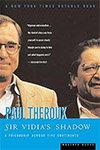Paul Theroux on necessary solitude, risks and the joy of writing (Malawi)
After 60 years and almost as many books, the novelist and travel writer, 83, will stop when he falls out of his chair.

“All creativity is uplifting,” Paul Theroux said. “I finish a book in a mood approaching rapture.
After 60 years of writing and publishing — and almost 60 books — I feel ordering my thoughts on paper to be not a job but a process of my life. You always hear writers complain about the hellish difficulty of writing, but it’s a dishonest complaint.
So many people have it much harder — soldiers, firefighters, field workers, truckers. The writer’s profession is a life of self-indulgence. With luck and effort, you make a living. The only difficulty is its necessity for solitude. Writing is not compatible with anything — its utter self-absorption is generally destructive to family life and friendships — and yet I find it joyous. All creativity is uplifting; I finish a book in a mood approaching rapture.
Having difficulty writing? Has it occurred to you that maybe you have nothing to write?
I once wrote a book, “Sir Vidia’s Shadow,” on my friendship with the writer V.S. Naipaul, whom I have described as a drill  sergeant who, if he had seen “Full Metal Jacket,” would most likely have shouted, “What is your major malfunction, numb-nuts!” He often prefaced his reading of my stuff with, “I must warn you — I’m brutal.”
sergeant who, if he had seen “Full Metal Jacket,” would most likely have shouted, “What is your major malfunction, numb-nuts!” He often prefaced his reading of my stuff with, “I must warn you — I’m brutal.”
Creativity is about experimenting — failing, failing again, failing better, as Beckett said. Growing up, needing privacy in a large family — I was the third of seven children — I became a fugitive, finding solace in libraries and in long hikes and in solitude, as well as in many menial jobs — anything to escape the conflicting demands and the scrutiny of my family.

In London in 1978.

At home in Hawaii in 2021.
When I began publishing stories and poems in magazines, the path became clear. But the path is never straight. When someone confides to me that they think they might have an ambition to write, I suggest they leave home — go away, get a job. Never enter a “writing program.” Rather, invite experience and especially take risks.
• • •
Current and upcoming projects: Published the novel “Burma Sahib,” his 57th book, in February. He is now planning his next reporting adventure for a new travel book.
• • •
Guy Trebay is a reporter for the Style section of The Times, writing about the intersections of style, culture, art and fashion.
Let’s hope that Theroux does not fall of his chair any time soon and writes yet another book as wondrous as “Burma Sahib” which captures the texture of Burma and the evil folly of colonialism. One of the best books of the year so far.
Barry Hillenbrand
Ethiopia 1963-1965
Theroux has inspired much of my travel writing, including my forthcoming book, The Moritz Thomsen Reader.
Possibly our most prolific, best-known RPCV author, after 60 years and almost as many books, he begins to reflect on his literary legacy in this brief but pungent interview.
I couldn’t agree more when he says, “writing is neither dreary nor a job. I see it as a process of life.”
I, too, am looking forward to his next travelogue, which I believe will be a road trip through Canada.
The Theroux interview above was truly inspiring in a profession … where it’s damned hard to make it as a professional scribbler. I have read some 80 percent of his books, now filling nearly two shelves in my third floor garret in Yokohama. Except for a few of those books that didn’t nail it, the others were wonderfully written and in my reading his travel stuff has helped take me far, of course, foremost Peace Corps Gabon then travel writing my way through Southeast Asia for All Nippon Airways’ inflight magazine Wingspan and other experiences as in red dot country. Of course quite few of us here can make it as pros, I had my tenured gig at Tokyo City University to help solve one of life’s greatest challenges and that’s making a living and hopefully a meaningful one, and keeping it while walling off blocks of time and protecting them with all your might so as to hump the bejesus out of the muse.
Anyway, It’s always been a toss up for me: Theroux or Updike?
Apples and oranges I know, but I love Updike’s ear but a little overdone is his incessant and close reach to the suburban, and the world building of our master of travel … and fiction, Paul Theroux. Although I’m semi-retired I have several projects but I’m slowly reading my way to The … Brothers novel by Paul which I cracked in the new year of the green dragon. Although PT has not as far as I know poked his head in here the interview above and Mark Walker’s refreshing review of his latest novel are about as good as it gets across this heartfelt site.
Thanks for having me!!!
I love these interviews with Paul Theroux, a writer I’ve been dedicated to for decades. I loved “Sir Vidia’s Shadow,” because I love Naipaul, too. This book is so personal and so sensitive about a difficult relationship between these two geniuses; I felt that it took some courage for Theroux to describe it. And we learn so much about each author!
Don’t fall off the chair before me. I have to read more of you, Mr. Theroux.
Leita Kaldi Davis